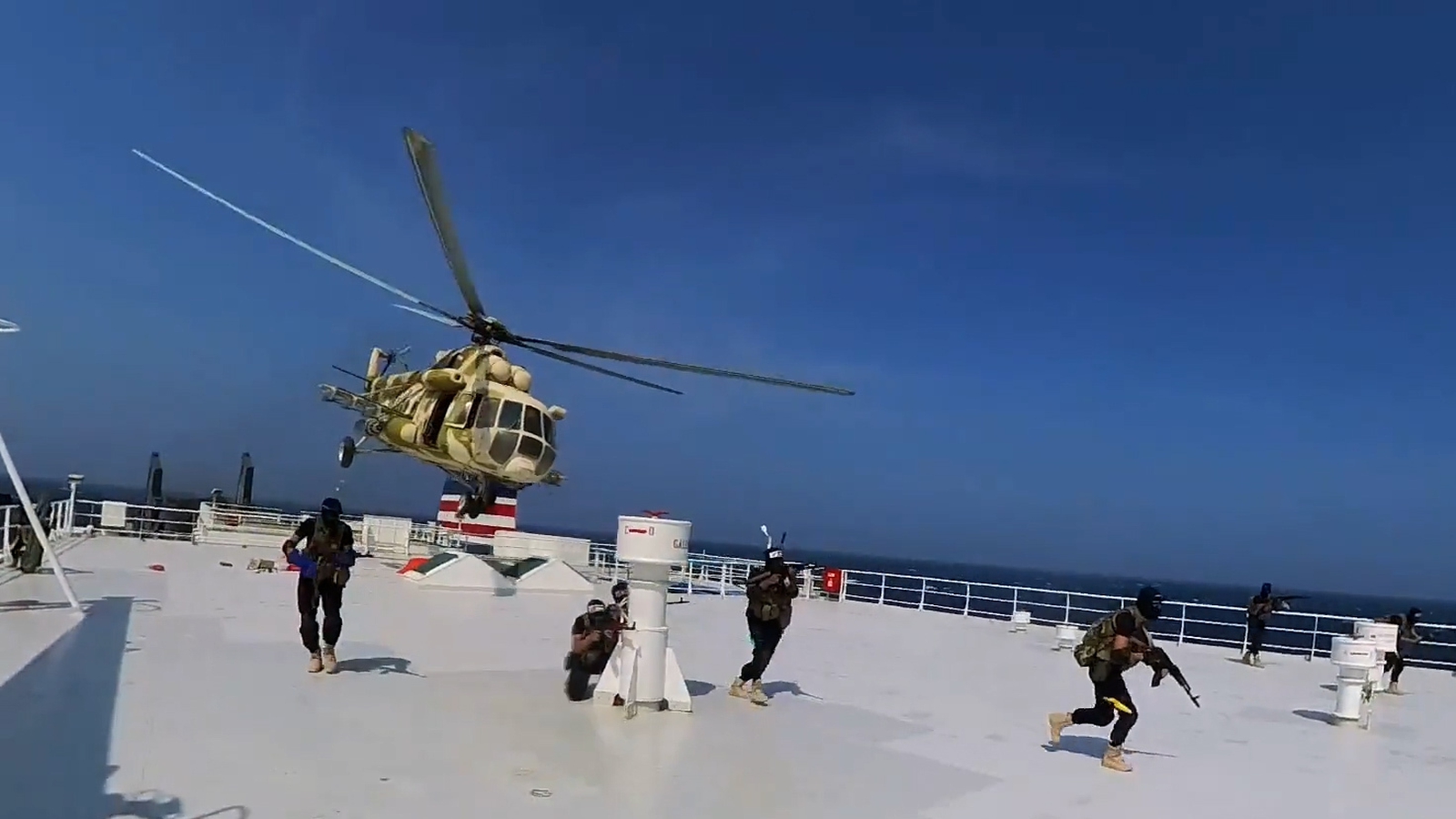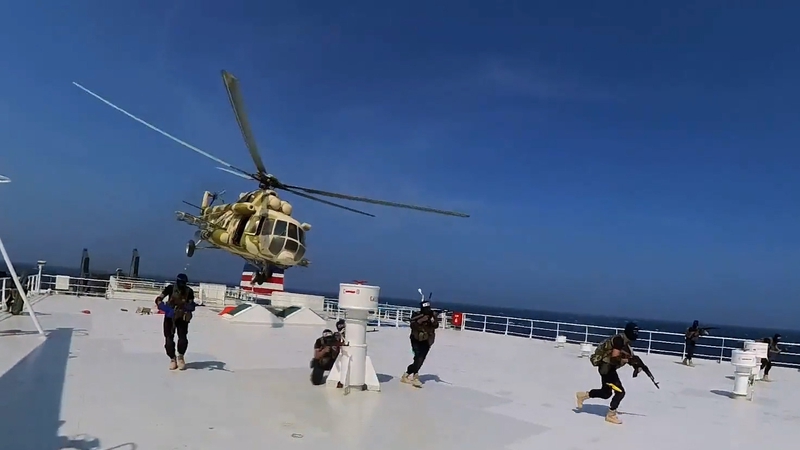Why experts expect Irish prices to rise if Houthi attacks persist


Disruptions to shipping traffic through the Red Sea caused by attacks by Yemen’s Houthi rebels could impact prices in Europe in the coming weeks, according to analysts who have spoken to Prime Time.
“Everything we’ve got here from our mobile phone to this bottle of water I’ve got in front of me, it has been shipped – or components of them have been shipped – in the past day, week or year,” says Professor Basil Germond, Professor of International Security at Lancaster University.
Consumers in Europe will soon be impacted by “increased insurance costs for shipping companies, or the cost of rerouting ships via other routes,” he added.
About 15% of global maritime trade transits through the Red Sea, along Yemen’s western coast. It is the shortest route for goods to get from Asia to Europe, typically taking about 25 days.
Recent attacks by Houthi rebels in the Red Sea have led major shipping companies, including BP and Maersk, to re-route their ships around the Cape of Good Hope in southern Africa, adding on average 10 extra days.
Container ships – named after the truck-sized containers they transport – have almost completely vacated the Red Sea route in recent weeks, although many oil tankers and other types of ships have – until recent days – continued to transit through the area.
On Monday and Tuesday, new Houthi attacks resulted in more tankers and bulk carriers setting course to avoid the Red Sea.
“That can quickly cost millions and millions to the global economy,” Prof Germond says.
The Houthi attacks have included drone strikes, missile strikes, and at least one hijacking: on 19 November rebels boarded the vehicle carrier, Galaxy Leader, after being dropped onto the deck of the ship from a military helicopter.
The Galaxy Leader is partly owned by an Israeli billionaire. It was being operated by a Japanese company and crewed by seafarers from the Philippines, Bulgaria, Ukraine and Mexico when it was boarded.
The crew of 25 is still being detained on the ship, which is now at anchor off the coast of Yemen.
Since it was hijacked, companies have been advising vessels of the heightened risk of transiting through the Red Sea, and brands like IKEA and Tesla have announced disruptions to their supply chains.
“If a ship is going to take the longer route around southern Africa to get to Europe there will be delays, there will probably be shortages,” Noam Raydan, a Middle East shipping analyst at the Washington Institute for Near East Policy.
“The impact will be felt, and is being felt now, but if the attacks continue… the impact will be stronger in the next few months.”
For the shipping companies, voyage costs will increase; more fuel stops will be needed, and additional port dues will need to be paid.
“All these costs will add up and in the end they have to pass them on somehow…consumers in the end will feel it,” Ms Raydan said.
On Tuesday, Vincent Clerc, the Chief Executive of Maersk – one of the world’s largest shipping companies – told the Financial Times that the Houthi attacks in the Red Sea “could cause significant disruptions at the end of January, February and into March.”
“It’s putting inflationary pressure on our costs… and ultimately on consumers in Europe and the US. It could potentially have quite significant consequences on global growth,” Mr Clerc told the FT.
Shipping companies that continue to use the Red Sea are also likely to increase prices to exporters, as they will note that they are taking risks others are not, Noam Raydan said.
“If my competitor is not taking that route and I can take it and address the demands of my consumers faster, then why not? I’ll take it, increase prices, make more profit,” she said.
Such increases add inflationary pressure to prices.
Footage of Houthi rebels seizing the Galaxy Leader in November. Credit: Yemeni Military Media via EBU
We need your consent to load this comcast-player contentWe use comcast-player to manage extra content that can set cookies on your device and collect data about your activity. Please review their details and accept them to load the content.Manage Preferences
Operation Prosperity Guardian
In an effort to restore security for maritime traffic in the area, an 11-member US-led coalition of countries launched ‘Operation Prosperity Guardian’ in late December. Naval vessels have been accompanying some commercial ships through the Red Sea, to and from the Suez Canal.
However, Houthi attacks have continued. In a significant escalation, on 12 January the US struck multiple targets in Houthi-controlled parts of Yemen with the intention of degrading the group’s military capabilities and deterring further attacks.
Nevertheless, on Monday 15 January the Houthis fired a ballistic missile at a US-owned commercial vessel in the Red Sea, causing a fire on board but no casualties. Afterwards, a spokesperson for the group vowed to target other US vessels, further heightening shipping and security fears for the region.
Prior to this, the Houthis had claimed that their attacks were only aimed at Israeli ships, or ships headed for Israel.
Such a response from the Houthis was predictable, according to Gerald Feierstein, former US ambassador to Yemen and now Distinguished Senior Fellow on US diplomacy at the Middle East Institute, Gerald Feierstein.
“The Houthis see advantage in getting engaged in a military back and forth with us,” he told Prime Time.
“They think, correctly, that standing up for the Palestinians is very popular in Yemen. Even those Yemenis who don’t support the Houthis, they will support the idea that the Houthis are in some way acting in defence of what’s happening to the Palestinians in Gaza,” Mr Feierstein said.
“They also see this as an opportunity to raise their regional profile and to demonstrate that they’re a strong member of the Iranian axis of resistance,” he added. “They wanted us to strike, and that’s what we [the US] did.”
On Tuesday 16 January, the US again struck Houthi locations, with Reuters reporting that an official said “missiles were struck because they were being prepared to target ships in the region.”
We need your consent to load this Datawrapper contentWe use Datawrapper to manage extra content that can set cookies on your device and collect data about your activity. Please review their details and accept them to load the content.Manage Preferences
Who are the Houthis?
The Houthis emerged as a political and military movement in Yemen in the 1990s, and launched an insurgency in 2004 against the Saudi-backed Yemeni government, which it accused of corruption.
Its members practice a form of Islam similar to the Shia Islam practiced in Iran, and by the Lebanese group Hezbollah. They receive material and other support from Iran, and do not recognise the existence of Israel.
“It was part of their narrative to express their opposition to the war in Gaza, but in practice what they wanted to do was to disrupt global maritime trade,” Prof Germond said.
He is sceptical that strikes on Houthi targets could have the desired effect of stopping further attacks and restoring safety to ships passing the Yemeni coast.
“They are motivated by ideology and politics. And that’s very important because it means that it’s much more difficult to deter them,” he said.
“If there is only one drone or one missile is passing through the net and destroying or heavily damaging a commercial ship, then the problem is there again, and shipping companies will not want to take the risk.”
As a result, analysts say governments and major industries will be closely watching what happens around Yemen in the coming days and weeks.
“I think the likely scenario is a continuation of where we’ve been over these past few weeks and months,” says Gerald Feierstein, “with the Houthis continuing their strikes and the US and its coalition partners having to make a decision on whether it’s reached a point where they need to respond again.”
Concerns about regional escalation
He is concerned the outsized geopolitical and economic impact of relatively small-scale attacks on commercial vessels may result in them occurring elsewhere and more often, as the war in Gaza continues, and regional tension remains high.
On Thursday, an oil tanker off the coast of Oman was seized by what the UK maritime trade organisation described as people in military-style black uniforms with black masks. Tanker Trackers, a maritime intelligence service, suggested the hijacking was likely to be linked to Iran.
We need your consent to load this Datawrapper contentWe use Datawrapper to manage extra content that can set cookies on your device and collect data about your activity. Please review their details and accept them to load the content.Manage Preferences
“Iran has now understood that disrupting the global maritime trade is really one of the means… to really have an impact on western economies,” Prof Germond says.
“I’m a bit worried that rogue actors and states will now more and more use this leverage to impact negatively on the global geopolitics and economy.”
Elsewhere in the region, on Monday night, Iran’s Revolutionary Guards Corp attacked what it claimed was an Israeli “spy headquarters” in Erbil, the capital of Iraq’s semi-autonomous Kurdistan region.
The Iranian missiles struck in the part of Erbil where a US consulate is located, leading to some initial concern that the US and Iran were being drawn into a direct confrontation.
The Iranian missile strikes followed dozens of attacks by Iranian-backed militias on US bases in Iraq in recent weeks, as well as Israeli strikes targeting Iranian assets in Syria and Hamas and Hezbollah members in Lebanon.
All have occurred with increased regularity since 7 October, when the Hamas attacks on Israel left hundreds of Israeli civilians dead, and triggered a massive Israel military bombing campaign in Gaza which the Hamas-run Gaza health ministry says has killed more than 24,000 Palestinians.
The resulting ramp up in regional tensions since 7 October has sparked massive concern that a regional war is developing and could draw in the United States and Iran.
“The solution to the problem in the Red Sea is the solution to Gaza, which is a ceasefire and some effort to stabilise the situation there,” says Gerald Feierstein, former US ambassador to Yemen.





